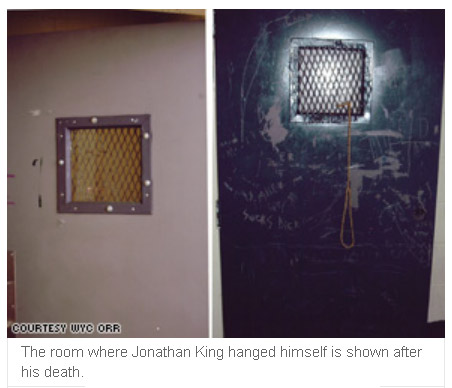Their voices cracked with emotion as they recalled a devastating loss. Don and Tina King's 13-year old son Jonathan hanged himself after a teacher locked him in a windowless 8X8 closet called a "seclusion room."
 Jonathan was a student in the Alpine Program, a public school in Gainesville, Ga. for students with emotional and behavioral problems. A few weeks before his death in 2004, Jonathan told his parents that teachers had put him in "time out."
Jonathan was a student in the Alpine Program, a public school in Gainesville, Ga. for students with emotional and behavioral problems. A few weeks before his death in 2004, Jonathan told his parents that teachers had put him in "time out."
"After he died, we found out that Jonathan wasn't in there for minutes," Don King said. "He was in there for hours at a time every day."
The Kings were among dozens of parents and activists demanding changes in state rules aimed at preventing a repeat of the Jonathan King tragedy. They spoke Wednesday at the Georgia Board of Education's public hearing. "I just want to say I don't want nobody else to go through what we've gone through with our child, "King said.
For decades, Georgia schools have used seclusion and various types of restraints on children with autism and attention deficit hyperactivity disorder to prevent classroom disruptions.
"I've seen handcuffs, hogties, kids being tied up with Velcro. I've seen kids locked in storage closets. And I've seen, very recently, a plywood box in a principal's office," says Leslie Lipson, spokesperson for the Georgia Advocacy Office.
Alicia Boyd told the board her 60-pound son was severely bruised when school instructors forced the child into a prone position and applied their weight on his body to hold him down. "He should not have been restrained," she said. "They should have realized that if you hold him by his hand, give him your undivided attention and talk to him... that was all they needed to do."
Georgia is not the only state where educators use these tactics in the classroom. The U.S. Government Accountability Office studied the issue in 2009 and found no federal laws restricting the use of seclusion and restraint in schools and widely divergent laws at a state level. Georgia is listed as one of 19 states that have no such laws.
The GAO report said public schools in Texas and California used seclusion and restraint 33,000 times in 2008 alone. Congressional investigators studied four cases where children died, including a 14 year old Texas boy who stopped breathing when his special-education teacher held him down by lying on top of him. GAO investigators could not determine whether such abuse was widespread, but they did find hundreds of abuse allegations during the past two decades. The report summarized some common findings:
- Children with disabilities were sometimes restrained and secluded when they were not physically aggressive
- Parents often did not give their consent for schools to these tactics
- Facedown restraints can be deadly
- Most teachers and staffers were not trained to use restraint
Georgia's new rules would ban seclusion and the use of chemical restraints such as prescription psychotic drugs, mechanical restraints such as handcuffs, and prone restraints, where teachers use their own weight to hold a child face-down on the floor.
At Wednesday’s hearing, some school officials agreed with the parents and criticized abuses but said there might still be times when restraints are used.
Kathy Wooten, Director of Special Needs in the Lee County, Ga. school district, cited the case of an emotionally disabled student who had injured other students and teachers. She said teachers were able to help improve the student's behavior with positive reinforcement. They put him in monitored seclusion and a restraint chair only when he was aggressive, Wooten said.
While praising the proposed rules change, activists are urging the board to add a provision requiring accountability and data collection. The Georgia Advocacy Office says there are no reliable numbers on how many times schools in the state have used seclusion and restraint. They hope some data will motivate administrators to track which schools need help reducing the use of restraint and which schools are supporting students well without restraint.
Parents are hoping for an additional benefit: better education for special needs children. Don King hopes that teachers and aides will adopt a more productive approach if a student has to be isolated.
"What they need to do is put a child off with a teacher, get that student calmed down and show him how not to be disruptive," King says. "If they can't do that, they need to call the parents and let them know what's going on with their child instead of leaving the parents in the dark like they did us."
The State Board of Education will vote next month on whether to officially adopt the new rules.
Ken Watts anchored the evening news at WAGA-TV and morning news at 11Alive. He has covered crime, politics, education and the arts in Atlanta for 29 years.
